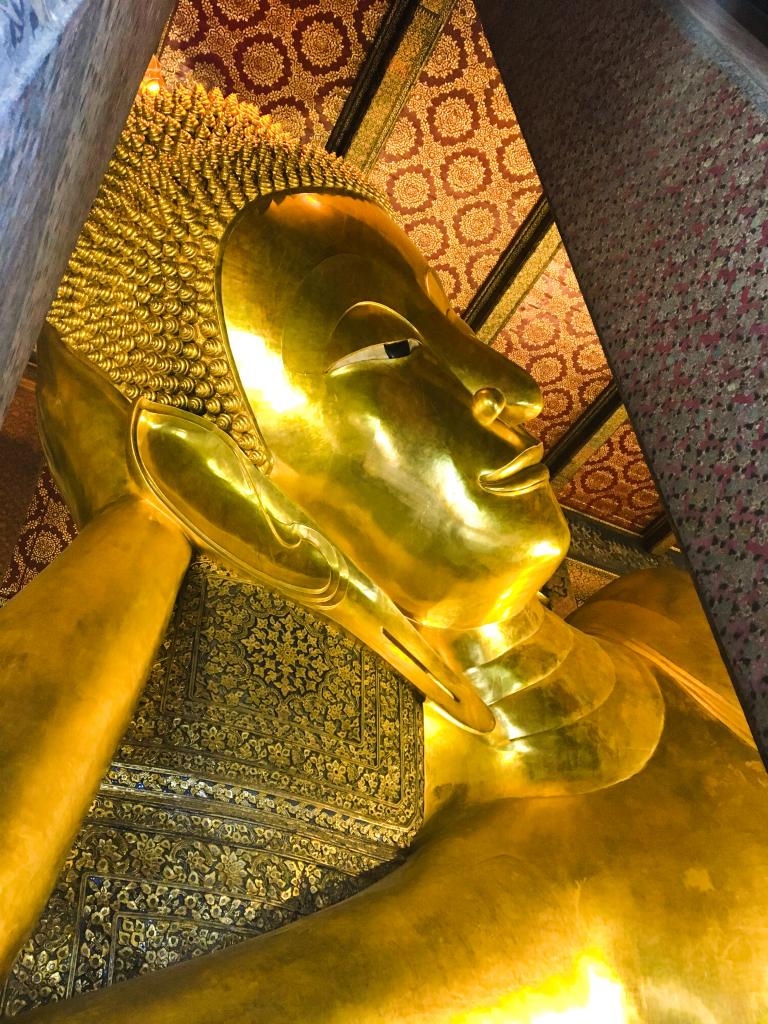Secondary menu
Found in Translation: A Summer at UNHCR Bangkok
Kristen Kephalas (2L JD/MGA)

Reclining Buddha in Wat Pho. Credit: Kristen Kephalas.
I did my IHRP fellowship at the United Nations Refugee Agency (UNHCR) in Bangkok, Thailand. I came into law school committed to my passion for human rights. I knew the IHRP fellowship could help me transform my passion into a realistic career path. I decided to pursue a fellowship at the UNHCR because my interest in refugee law is what brought me to law school in the first place. Since the UNHCR is the refugee status-granting body in Thailand, I wanted to work there to familiarize myself with the decision-making process.
At work, I was tasked with a variety of responsibilities including research, one-on-one counselling, analytical writing, and investigative interviewing. I learned about the political situations, cultural intricacies, and histories of numerous countries in Asia, the Middle East, and Africa. I worked with interpreters and picked up words and phrases from various languages. I also learned about the situation for refugees in Thailand’s unique socio-political context, which turned out to be the source of one of my biggest challenges. Thailand does not recognize refugee status, so the conditions that asylum seekers and refugees face in the country are abysmal. This context severely hinders efforts to improve the livelihood of the UNHCR’s Persons of Concern (PoCs) and it is hugely disheartening. It made the work feel frustrating and sometimes futile. However, the compassion and drive of the team at UNHCR was inspiring even in the most dismal of cases.
Interviewing and counselling PoCs was the most challenging, but enriching aspect of my fellowship. With the aid of interpreters, I got to speak with PoCs individually and learn about their lives and their challenges back home and in Bangkok. I did community and protection counselling at the Bangkok Refugee Centre (BRC), a partner of the UNHCR. The BRC is a community centre that offers counselling on issues such as getting children into school, navigating financial challenges, avoiding arrest, and staying on top of the administrative requirements of asylum applications. Sometimes people come to BRC with urgent and serious concerns like homelessness, acute mental illness, and fear of violence from domestic partners. These issues in particular forced me to keep my cool and flex my problem-solving skills in order to work collaboratively with individuals to help them find immediate solutions like organizing home visits by UNHCR staff or referring them to shelters and mental health supports.
I had never been to Asia before the IHRP, so arriving in Bangkok after a twenty-four hour journey completely alone and utterly disoriented was stressful. Once the jetlag subsided, I tried to find my rhythm in a city that can turn on a dime. Bangkok is an endless trove of diverse experiences and people. Even after four months of thoroughly exploring the city, I barely scratched the surface. Yet, by the time that I had to pack up my apartment and head back to Canada, Bangkok had become a home. While I loved my day job at UNHCR, my best memories of my fellowship happened outside of work hours with the friends I made from all over the world. I found a family in Bangkok that I had not expected I would. After a grueling year of 1L where lonely late nights in Bora Laskin dominated, spending a summer surrounded by folks from all walks of life was reenergizing.
My advice to anyone looking to do an IHRP fellowship is to challenge yourself. Find an organization that will give you meaningful and difficult work in a place that is unfamiliar to you. The IHRP fellowship is a unique opportunity to get out of your comfort zone and grow as both a law student and an individual.
